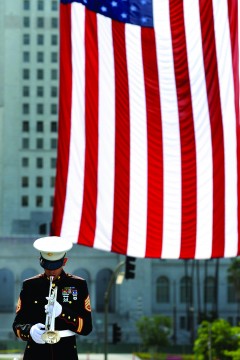
Twelve years after almost 3,000 people died during the terrorist attacks on Sept. 11, 2001, Fresno State students and faculty reflected on the day’s impact.
On Sept. 11, 2001, four passenger airliners were hijacked by 19 al-Qaeda-affiliated terrorists and were flown into the two World Trade Center towers and the Pentagon. Another plane crashed into a field in Pennsylvania when the passengers attempted to take back the plane.
It was the deadliest terrorist attack in U.S. history. In the end, 2,977 people were killed.
The images of that day are deeply embedded into the minds of many Americans. The impact of the attack was felt across cultural, generational, and physical boundaries around the world.
“They’d all seen horrendous things.”
Dr. Lori Clune, a history professor at Fresno State, was in the New York area for a family wedding days before the attack, but she returned to Fresno to teach her class at Fresno City College. On Sept. 11 she woke up and followed her normal routine, turning the radio to NPR and listening to the morning news. The broadcaster’s tone unnerved her.
“I went and turned on the television, and I thought it was a movie,” Clune said. “Then you go to several channels and you see the same movie, and you realize it’s not a movie. My older son was very upset because he knew I had just been in New York and I could have been on a plane.”
When Clune returned to New York after her grandmother died, she remembered, “You went over the site and it was still smoking a month later.”
At the funeral she sat next to a woman whose son, a firefighter, died in the second tower.
“This had been like her fifth funeral that week,” Clune said. “Mourning my grandmother was nothing compared to the trauma that everyone around me was feeling. They’d all seen horrendous things.”
One of the lasting effects of the attack, Clune said, was changing what Americans thought of their future.
“With that sense of the turning of the 21st century, there seemed to be an incredible sense of optimism,” Clune said. “The Cold War was over. It seemed like things were getting better and safer. I think 9/11 knocked everyone down and said ‘not so fast.’ Just because we’re not in this huge Cold War conflict with the Soviet Union doesn’t mean we’re safe.”
“Everything stopped that day…”
Daniel Clark, a junior at Fresno State and Associated Students, Inc. senator, was 12 years old on Sept. 11, 2001.
“I remember waking up and every single channel was breaking news, breaking news, breaking news,” Clark said. “I had no idea what was going on. All I knew was that these planes had crashed into a building.”
Clark said it seemed his school was in shock.
“I remember getting to school and everything was at a standstill,” he said. “Every single class I went to that day had the news on. No one was instructing for like two days.
“Everything stopped that day, and everything since that point has changed for us. My family wasn’t very political. My family never really paid attention to current events, and this changed that. This was that moment that really made us all pay attention.”
For the generation that grew up in the shadow of the terrorist attacks, Clark said they have seen the country change.
“We saw firsthand what happened with the Iraq War; what happened with our freedoms,” Clark said. “We saw our brothers and sisters either die or get injured, come back with PTSD, and I don’t think our generation wants to see that anymore.”
“We didn’t understand what was going on…”
Qaboos Muthana is a third-generation American who was born in Yemen. A member of Fresno State’s Muslim Student Association, Muthana remembers watching the news coverage on the morning of Sept. 11 with his fourth grade classmates at school.
“We didn’t understand what was going on, and as soon as the towers went down everyone started freaking out,” Muthana said.
“It took about a week before I understood that this was going to impact my life.”
After the U.S. government discovered that Osama bin Laden and Islamic extremists orchestrated the attack, Muthana said people wanted to connect the religion and the terrorists together. As a result, Muthana said, he was bullied.
He recalls some classmates calling him a “terrorist,” saying that Osama bin Laden was his uncle and asking, “Why’d you let him do this?”
He added that two students who used to make fun of him have, “really become close friends.”
“My mindset has changed, so rather than becoming angry or defensive I use it as an opportunity to educate or to talk to let people see the truth.”




